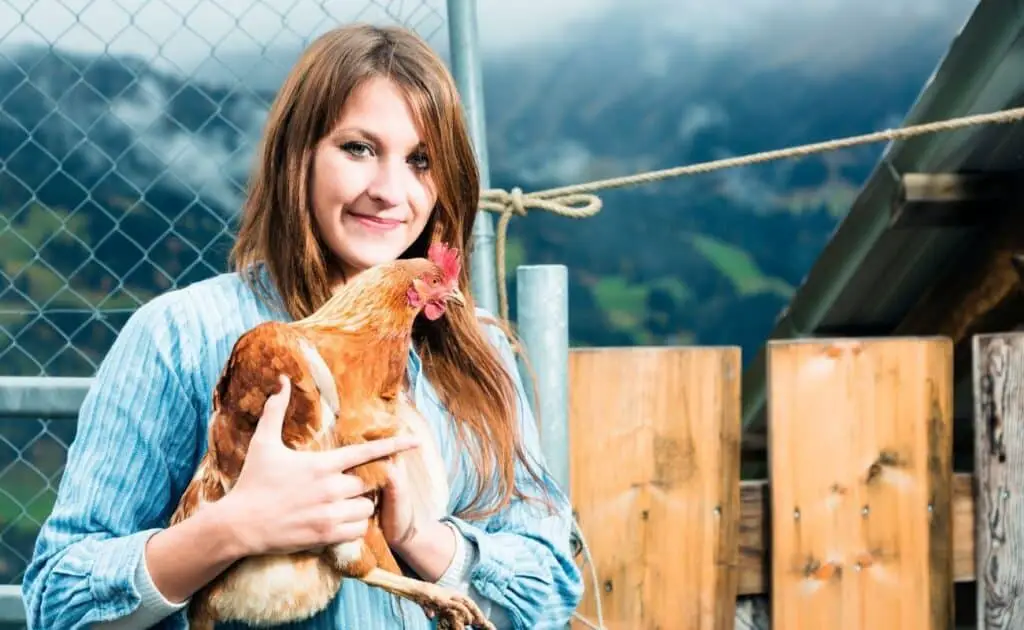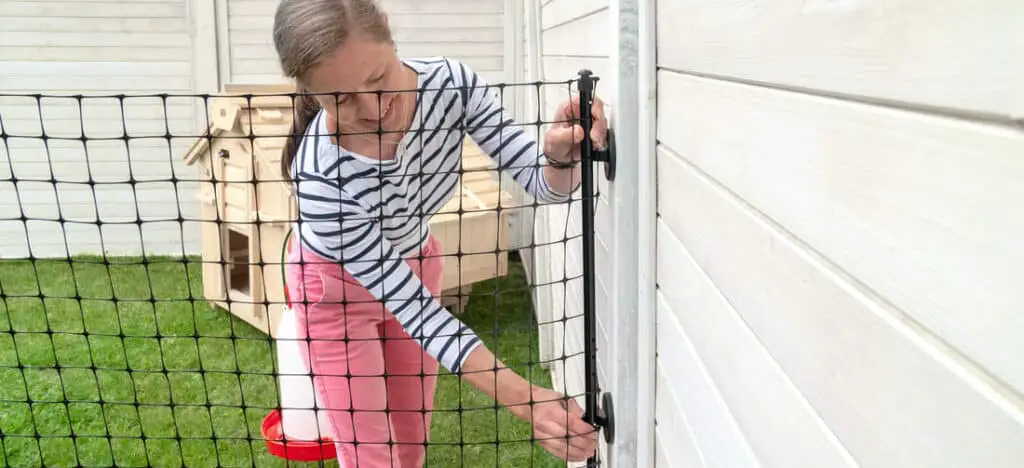Chickens are charming, sometimes amusing birds that make great backyard pets. You may wonder, can you have an indoor pet chicken? No, is the short answer.
You see, chickens harbor illnesses, like the bird flu, which people can contract. These can make you seriously ill.
It would be virtually impossible to avoid contamination with a pet chicken living indoors, leaving feathers, droppings, and dandruff. Instead, Keep your chickens outdoor-only, and wash your hands after contact with them to reduce the health risk.
Here is our recommendation for Outdoor chicken coops ↗️
Table of Contents
About Pet Chickens in General
Appearance
You are probably the most familiar with the Redhorn Chicken. This is your classic, white-feathered chicken, which sports a scarlet crest.
There are lots of other breeds available, as well, such as the gray-and-white-striped Plymouth Rock Chicken; the magnificently maned Brahma Chicken; the glossy auburn-and-ebony Rhode Island Red; and the Astralorp, with feathers that are a striking solid black.
Silkie Chickens are quite popular for beginners. They are prized for their ultra-fluffy, soft feathers, and are another great pick!
All chicken types have your typical stocky, plump build, which gives them a very cute -and sometimes rather silly- look.
Personality
Chicken personalities vary by bird. Some chickens are surprisingly intelligent and have even been known to show empathy. Other chickens are, well, a little ‘bird-brained….’ Some chickens have sweet and mild temperaments, and other chickens are a bit sassy, or bossier. One thing all chickens have in common? They will never turn down a snack.
Chickens can be fun to watch as they cluck merrily about, gobbling up grains and fruits and simply hanging out with one another.
Once a chicken gets to know you, they may allow you to pet and even hold them. They may show affection.
Most chickens will be a bit timid, and this is because, in the wild, they are a prey animal. You may be tempted to keep your pet chicken indoors in order to protect them from danger. This is a risky idea, however!
Indoor Pet Chickens are a Serious Health Risk
So, why are indoor pet chickens such a health risk? These birds tend to carry illnesses, many of which can make us sick. For example, chickens can carry bird flu, salmonella, and campylobacter.
Of these chicken-carried illnesses, people most commonly contract salmonella. This is a very unpleasant illness, the symptoms of which include diarrhea, abdominal discomfort, etc. Sometimes, life-threatening symptoms will also follow.
The most at-risk are children, pregnant women, older adults, and those with weakened immune systems/chronic illness, etc. Your chickens may look clean, but they are not really, ever.
Can you have an indoor pet chicken? Imagine them leaving droppings in random areas, and getting germs on your furniture, your kids, your carpet, etc. This is not a safe situation, as you can see! Fortunately, you can keep chickens perfectly safely -outdoor.

Never Wash a Chicken Indoors in the Bath or Sink
Perhaps you have considered washing your pet chicken inside your house, in the bath or the sink. Sadly, the illnesses that chickens carry cannot be gotten rid-of so simply.
No matter how much soap you use, the germs will still spread to your bath, your sink, your counter, etc. Even if you are very careful, there will still be germs leftover that can all-too-easily make you -and other people- sick.
Outdoor Chickens Will Need a Coop for Shelter
You can purchase a chicken coop online for a couple of hundred dollars, or you can do some crafty chicken coop DIY. Either way, your coop must be both secure, and weather-proof.
Most chickens will need no less than three square feet of room per bird, according to the University of Georgia. Many chicken owners consider more like five feet per chicken to be ideal, however.
These guidelines are for chickens that have an outdoor range, with plenty of room for activity, and fresh air. If your chickens do not have an outdoor range, they will need more space inside of the coop: eight feet per chicken, or more.
If you are making your own chicken coop, you will need to use plywood. This is a wood that is not only durable but also affordable, and fairly weather-proof. Your chickens will need ventilation in the coop, so you will need to cut windows into the plywood wall.
Mesh wire of an extremely heavy gauge can be used to create ventilation for your flock. Ventilation is key when it comes to keeping your chickens healthy.
The fresh air filtering through will help dispel germs, toxic odors from droppings and urine, etc. Just remember that the wire must be very strong, in order to deter a determined predator.

You should take a look at the plastic fencing from Omlet here USA Prices and to see the UK Prices click here. It’s one of the most portable fencing systems for chickens we have found.
Quarantine Birds That are Sick
Sometimes, chickens themselves will fall ill. This can be due to stress, a weakened immune system, exposure to germs, etc. It’s very important to quarantine any chickens that are sick.
This will help prevent the illness from spreading, and also allow you to give your sick chicken attentive care. A sick chicken will need to go to the vet, as well.
Protect Against Predators
Poor chickens. They are such plump birds, and mild-tempered, and they aren’t very good at protecting themselves. This makes them the perfect prey animals, and they are easy targets for raccoons, snakes, dogs, cats, birds of prey, mongooses, coyotes, foxes, etc.
To protect your chickens, you will need to set your coop up a few inches above the ground. The wire fencing should continue down into the dirt, however. This will help guard against snakes or any other kind of sneaky predator.
The door should also have a lock. Raccoons have otherwise been known to open the doors, inviting in danger!
Don’t Keep Pet Chicks Indoors Either
You may be tempted to take your delicate, fluffy chicks inside your home. Unfortunately, this is still a health risk. Through contact with their parents and the coop, chicks quickly pick up the same sorts of germs and illnesses that can make people sick.
Instead, make sure your coop has a cozy, secure nesting box. Also, consider investing in an outdoor brooder.
Maintain Coop Hygiene to Reduce the Health Risk
- Every night, in your chicken coop, you will need to get rid of any leftover food and water.
- Clean out the droppings and bedding once a week. For the bedding, you will want a good-quality, absorbent material, like aspen wood shavings or straw.
- Do a deep-clean of the coop twice a year. This means using a hose, and a heavy-duty cleaner (like vinegar) to rinse out and disinfect the chicken coop and nesting box.
- Dry up any standing water, and allow the rest of the coop to air dry, including the nesting box.
- Always wash your hands and clothes after any contact with your pet chickens, to reduce the health risk.
Final Thoughts
As you can see, having an indoor chicken would be a serious risk. Fortunately, you don’t have to keep an indoor pet chicken; instead, you can build your chickens a weather-proof, secure, and well-ventilated coop of their own! Just remember, when interacting with chickens, always wash your hands after.




